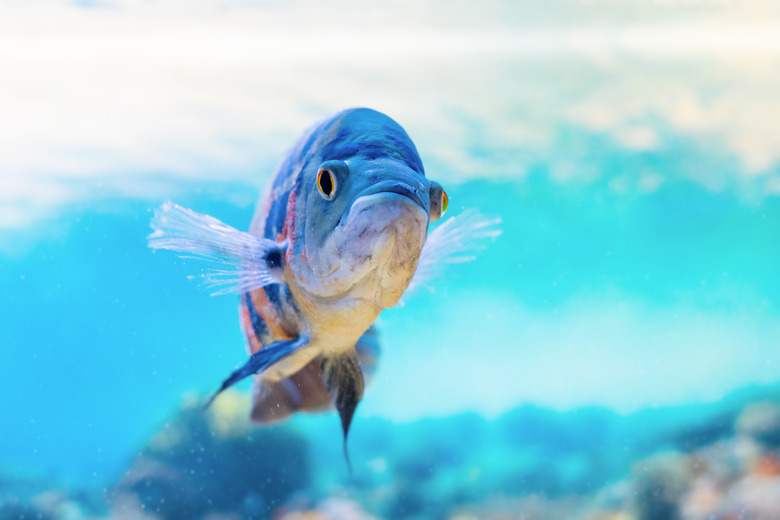How To Make An Oscar Fish Grow Faster
Oscars are not only one of the best cichlids for beginners but they're also one of the fastest-growing freshwater fish, reaching an average size of 12 to 16 inches in the first 14 months of life. Although there is no way to make a fish grow faster than Mother Nature intended, there are ways to help your oscar reach his full growth potential during that time frame.
Provide the right environment
Provide the right environment
Your oscar cichlid needs a healthy environment to achieve maximum growth during her first year. An unpolluted environment is key. Oscars put out a lot of poop that creates a heavy bioload for your filtration system to handle. Get a top-quality canister filter and use a hanging filter on the back of the tank for backup to ensure pollutants don't stunt your fish's growth.
Oscar fish thrive in water that has a pH of 7.2, so make sure the pH stays within a range of 6 and 8. It's normal for pH to vary throughout the day, so be sure to measure it at the same time of day. Waste products can make the water get too acidic, limiting a fish's growth and causing other health issues. Know how to raise the pH in your aquarium to give your oscar the best conditions for growth.
Give him room
Give him room
In the wild, oscars can reach lengths of up to 18 inches, as they have unlimited room to swim around. Get your oscar the biggest tank you can right from day one to encourage maximum growth.
Although oscars can do well in pairs and even live in aquariums with other similarly tempered cichlid species, they thrive best on their own in a very large tank. A 75-gallon tank or larger is ideal, especially if you want to add oscar tank mates. If your oscar will grow up solo, a 55-gallon tank will do.
Make sure to keep the aquarium underpopulated, or your aggressive oscar may do some population control of her own. Fish should be roughly the same size as the oscar. Smaller species will end up being feeder fish as your oscar rapidly grows.
Oscar fish food for fast growth
Oscar fish food for fast growth
For maximum growth, provide your oscar cichlid with high-quality nutrition. Oscar fish food for fast growth involves feeding the right amounts, not overfeeding. Serve a few floating pellets two to three times a day to your fast-growing cichlid when he's under 6 months old. Then, reduce the feedings to once or twice daily. Keep in mind that your cichlid will always act like he's hungry, and once he equates your approach with the pleasurable act of eating, you can rely on him waiting expectantly at the top of the tank.
Supplement cichlid pellets with fresh foods. Oscars are omnivores, so healthy foods include shrimp and worms. These should be fed a maximum of three or four times a week. For veggies, clip fresh spinach or a lettuce leaf to the side of the tank for a few hours and toss in a cooked pea at mealtime once or twice a week. Think "fresh, quality, variety" when offering supplemental food.
Don't overfeed your fish. Fish don't develop rolls of visible fat that can tip you off to them being overweight, but they can develop fat around their organs. Fatty liver disease is one health problem that can develop if you overfeed your oscar. An unbalanced diet could also result in hole in the head disease, which can cause your fish to stop eating and die.
Keep an eye on your fish
Keep an eye on your fish
Unusual behavior is typically the first sign that something might be amiss with your oscar. If your fish generally rises to the top of the tank to greet you and let you know she's ready to receive food but stops doing so, it's a clear indicator that she's not feeling well.
Leaning to the side, clamping the fins, or just a generally scruffy appearance can also be signs that your fish is either ill or living in toxic conditions. Test your water parameters to make sure your fish isn't being slowly poisoned by nitrates or burned by acidic conditions. If you suspect your fish is ill, consult a professional aquarist or fish vet to help get your fish on the path to healthy growth.
References
- Animal Diversity Web: Astronotus ocellatus
- Aqua Goodness: What Do Oscar Fish Eat? (A Complete Guide)
- PetCoach: Overfeeding Fish: Why It's a Problem and How to Avoid It
- FishLore: Freshwater Fish Disease Symptoms and Treatment
- ModestFish: Oscar Fish Care Sheet: How to Give your Oscars a Long, Happy Healthy Life
